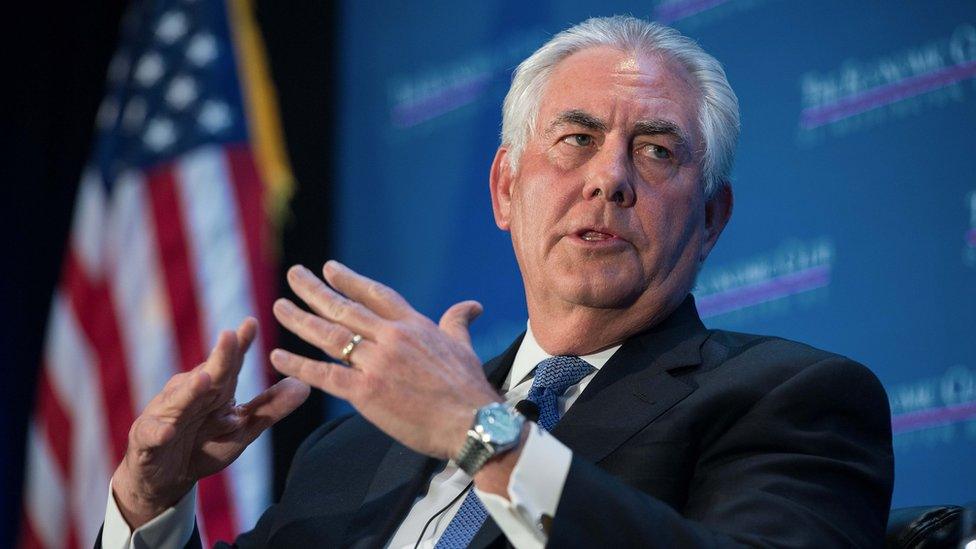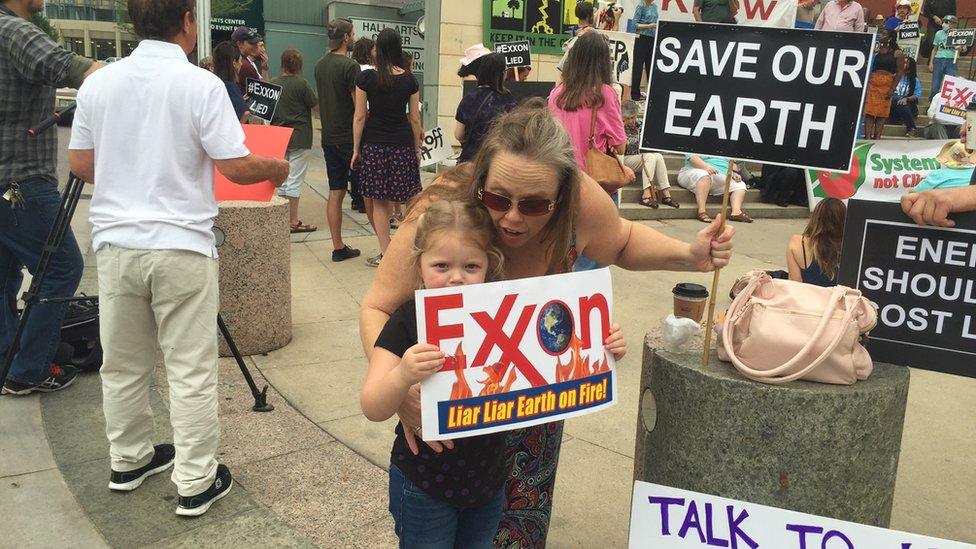Oil change? Fossil fuel advocate to run State department
- Published

Rex Tillerson is set to become Secretary of State in the Trump administration
Good news for environmental campaigners: President-elect Trump has finally nominated someone to his cabinet who actually believes in climate change science.
The bad news for those same campaigners is that this true believer happens to be CEO of Exxon Mobil, and also sees fossil fuels as critical to humanity's survival.
Rex Tillerson is undoubtedly an unusual choice for Secretary of State, but perhaps less so when seen against the background of several other Trump nominees supported by the oil and gas industry, including former Texas Governor Rick Perry who is the pick for energy secretary.
Mr Tillerson may differ from the others on the causes of climate change, but he definitely subscribes to their view that an abundant supply of fossil fuels is critical to making America great again.
Turn off the taps
Last May, Mr Tillerson reiterated his company's perspective on climate change, delivered in his strong Texan twang, which dominated the Exxon Mobil Annual General Meeting in Dallas.
"For many years, Exxon Mobil has held the view that the risks of climate change are serious and do warrant action. We believe that addressing the risk of climate change is a global issue," he said.
Mr Tillerson is in favour of a carbon tax as the best way to reduce emissions, a view not likely to go down well with his new colleagues in government.
At the AGM, he was clearly not in favour of mild shareholder resolutions asking corporations such as his to support the goal of keeping global temperature rises below the 2C.

Protestors young and old were making their feelings heard at the Exxon Mobil annual general meeting in Texas
"We got to have some technology breakthroughs," Mr Tillerson said last May.
"Just saying turn the taps off is not acceptable to humanity."
"The reality is there is no alternative energy source known on the planet or available to us today to replace the pervasiveness of fossil fuels in our global economy, in our very quality of life, and I would go beyond that and say our very survival," he thundered.
Tough negotiator
This practical approach and Mr Tillerson's track record in building a relationship with Russia are key to his appeal to Mr Trump.
Under his guidance, Exxon Mobil has acquired drilling rights to millions of hectares of land in Russia. In fact, the company now has larger holdings in that country than in the US.
When President Vladimir Putin forced a number of foreign corporations to give back control of a huge gas project on Sakhalin Island in 2007, Exxon's holdings remained untouched. A few years later, Mr Tillerson received the Order of Friendship from the Russian leader.
Another factor that will have endeared the Exxon CEO to the President-elect is his toughness. When the government of Venezuela attempted to nationalise foreign oil companies, most of his competitors tried to negotiate compensation. Tillerson took Venezuela to an international court and won.
The current US Secretary of State, John Kerry, has made dealing with climate change a central theme and has played a major role in delivering concrete actions including this year's agreement on the phasing out HFC gases.
It is unlikely that Mr Tillerson will take a similarly active role. Under his control, Exxon has been on the back foot on climate change, having to deal with a series of state investigations, external into how much the company knew about climate science and whether it kept this information from shareholders. That background worries many green campaigners.
"One of the critical tests at his confirmation hearings must be his demonstration of a true commitment to America's leadership on climate action, including fully supporting the Paris Agreement and honouring the country's international climate commitments," said Dr Andrew Steer, from the World Resources Institute.
"Anything short of that would be unacceptable to the majority of Americans - more than 70% of whom support the nation's participation in the Agreement."
It will also be interesting to see how Mr Tillerson adapts to the more intrusive world of being under media scrutiny 24/7.
At the Exxon AGM, journalists from the Guardian were barred from the meeting in Dallas - Exxon argued that the newspaper was not "objective" in their reporting.
Reporters who did attend had to view the meeting on a TV screen in an adjoining room, and we weren't allowed to record any pictures from the feed.
The TV showed a single shot of Mr Tillerson addressing the camera all through the event. There were no shots of the audience, nor of people asking questions.
Just the stolid, expressionless presence of Rex Tillerson for a couple of hours.
I wonder if this is how he will attempt to run events at State?
Follow Matt on Twitter, external and on Facebook, external